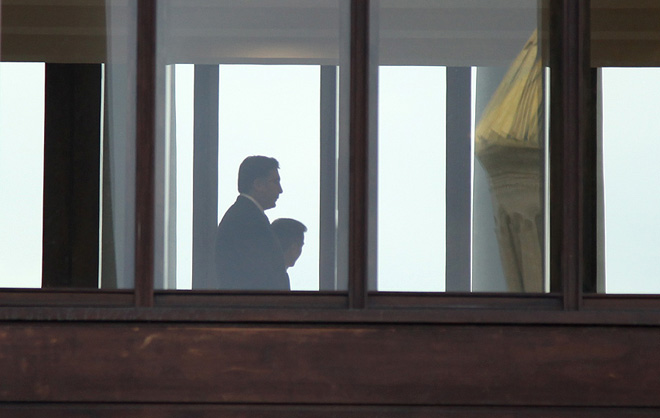
Special Commentary: Georgia’s Moment of Truth
Publication: Eurasia Daily Monitor Volume: 9 Issue: 187
By:

In the wake of the opposition victory in Georgia’s parliamentary election (Civil Georgia, October 2), the jubilation or sorrow that was felt initially among Georgians and Western pundits alike, depending on whether they supported President Mikheil Saakashvisli or challenger Bidzina Ivanishvili, will be short-lived. Both sides now face much more serious challenges ahead, which will have huge implications for Georgia’s future (see EDM October 4). The opposition’s unexpected victory in Georgia’s October 1 parliamentary election forces a French-style “cohabitation” between a presidency and a parliament controlled by opposing forces. On the one hand, they can both conduct themselves in a manner worthy of a democratic society, in which case Georgia will become a true part of Europe. Alternatively, if they do not, they run the risk that few in the West will care about Georgia’s fate, with potentially disastrous implications.
The elections indeed featured a stark choice between two larger-than-life personalities for the usually sunny but presently conflicted country in the Caucasus. On one side was the ruling party of Mikheil Saakashvili, the country’s colorful and assertive president, who took power in the peaceful Rose Revolution almost a decade ago. On the other side stood the diverse coalition led by the eccentric billionaire Bidzina Ivanishvili, the country’s richest man, who had been a Saakashvili ally but broke with the president a year ago to enter politics.
During his nine years in power, Saakashvili presided over far-reaching reforms that eliminated petty corruption, deregulated business, and built the foundations of a modern state and a liberal democracy (Georgia Online, October 8; The Messenger, October 9). Saakashvili’s United National Movement party government managed to achieve all this in spite of constant heavy handed meddling from Russia, including bombings and a full-scale armed invasion that resulted in the occupation of a fifth of the country’s land. Yet, his administration had come under increasingly forceful criticism, at home and abroad, over his purportedly authoritarian inclinations. Many, including Western experts, claimed President Saakashvili was determined to cling to power even if that meant falsifying the elections.
As for Ivanishvili, his wealth—comparable to half of the country’s GDP—became a unifying glue for the opposition, providing it with the capability to match the ruling party’s advantages of incumbency, especially in terms of mobilizing voters and access to media (see EDM, January 24). Yet, Ivanishvili, a political novice, faced questions of his own. First, his lack of a clear ideological platform became glaring as his coalition came to include everything from pro-Western liberals to die-hard Georgian nationalists (see EDM, July 24). Second, the fact that he made (and until recently kept) his fortune in Russia was used by Saakashvili to accuse him of being Moscow’s puppet, accusations that were nevertheless never backed up with evidence.
Presidential elections must be held before the end of 2013; until then, Saakashvili will remain president, while Ivanishvili’s Georgian Dream coalition is expected to control parliament, which should make him the country’s prime minister. And given the bad blood accumulated in a very antagonistic electoral campaign—both forces painted their opponent as a threat to Georgia’s very statehood—it is a legitimate question whether “cohabitation” between Georgia’s opposing strongmen could work.
Yet strangely, both Saakashvili and Ivanishvili may conclude that it has to work, for the sake of Georgia’s future as well as their own legacies. They are now joined at the hip: Georgia’s friends as well as foes will watch the power struggle between them with keen interest.
Skeptics in the West have regularly sought to put the brakes on Georgia’s Euro-Atlantic integration with the argument that the country is not politically mature or democratic enough for closer ties with the EU and NATO. But they can no longer point at Saakashvili’s alleged authoritarianism as an excuse. If anything, the holding of elections that met most Western standards and Saakashvili’s rapid concession of defeat (Civil Georgia, October 2) suggests that many should revise their perception of his leadership; and some may owe him an apology.
Instead, Georgia’s next litmus test will be whether its raucous politics can be handled within the democratic process. If Georgia’s leading politicians succeed in taking the country forward in an orderly democratic process through and beyond the presidential election, it will be very difficult for anyone—whether in the West or, indeed, in Russia—to maintain roadblocks on Georgia’s path to European integration. Should they fail, however, and Georgia descends into Ukrainian-style chaos and recriminations, the critics arguing that Georgia is an immature country that does not really belong in Europe will be vindicated. Given that both Georgian leaders define Euro-Atlantic integration as their highest goal, their incentive to work matters out should be strong. Initial talks on the handover of power appear to have gone well (Civil Georgia, October 6, 8), but the process is unlikely to be easy.
To Georgia’s north, Russia’s current leaders appear not only to hope for the worst, but can be counted on to actively undermine Georgia’s political process. Since the war, Russian secret services have been responsible for numerous bombings on Georgian territory (see EDM, July 29, 2011), and just before the elections, the EU’s monitoring mission warned of a Russian military buildup in South Ossetia, the Russian-controlled breakaway region only 60 miles from Tbilisi. Moscow still wants Georgia to fail, and is unlikely to resist the temptation to meddle in Georgian affairs (see EDM, October 4).
Georgia could prove that peaceful revolutions can succeed in bringing about both democracy and stability, and make countries ever more reliable Western allies. Therefore, especially given Georgia’s strategic location, its success is strongly in the interest of the United States and Europe. But considering the challenges that Georgia’s leaders will face in coming months, Western leaders will not have the luxury of simply standing by. Their advice and support to both Saakashvili and Ivanishvili may be crucial in determining whether Georgia once again proves able to overcome the challenges it faces.




